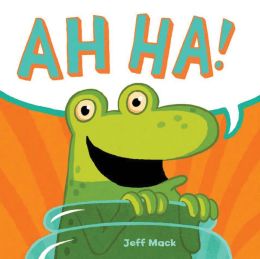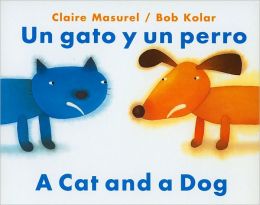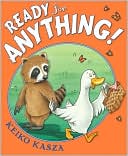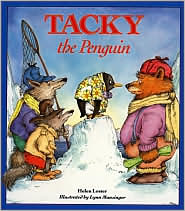Introduction: Our next book is a board book that is cleverly cut in the shape of a tractor. We won't read the whole book, but this is a good introduction to a tractor, its different parts, and what it does. Let's look at the cover. What do you see? (lights, tires) What does a tractor do? . . . Good ideas! Let's find out more. [Choose a page or two to share.]
Early Literacy Aside--Example: Adults, when we talk with our children, even our young children, about factual information, we help them learn about the world. This introduces them to the background knowledge they will need to later understand what they read. Even if they do not understand everything we say, it is still important to share the information with them.
Early Literacy Aside--Empower: Adults, you do not need a book to share factual information with your children. As you are doing things together or going places together, share information you know about any topic of interest. You are building your child's background knowledge about the world which helps with comprehension. And! they are so very curious about the world.





 Read through Breakfast for Jack by Pat Schories (or another wordless book of your choice) Let the children contribute to the conversation as you go through the pictures in the book.
Early Literacy Aside--Example: Using wordless books and having your child tell the story is one easy way to develop your children's narrative skills--having them tell stories. They can tell the story different ways when reading the book several times.
Early Literacy Aside--Empower: I have displayed some wordless books today. Feel free to check them out and have your children tell you the story. If they seem to be stuck, you can ask open-ended questions like "What do you see in this picture? What do you think is happening here?" If you are telling the story together, remember to follow your child's lead. Supporting your children's narrative skills helps them later understand what they read.
Read through Breakfast for Jack by Pat Schories (or another wordless book of your choice) Let the children contribute to the conversation as you go through the pictures in the book.
Early Literacy Aside--Example: Using wordless books and having your child tell the story is one easy way to develop your children's narrative skills--having them tell stories. They can tell the story different ways when reading the book several times.
Early Literacy Aside--Empower: I have displayed some wordless books today. Feel free to check them out and have your children tell you the story. If they seem to be stuck, you can ask open-ended questions like "What do you see in this picture? What do you think is happening here?" If you are telling the story together, remember to follow your child's lead. Supporting your children's narrative skills helps them later understand what they read.

 Early Literacy Aside--Explain: Talking with your children while reading, encouraging them to make comments and ask questions is one way to share a book that develops your child's understanding of the book. Make reading with your child a postive experience by allowing your child to make comments and ask questions. Try to focus all your attention on your child for that time.During the storytime, demonstrate these techniques with one or more of your books. Point out what you are doing.
Early Literacy Aside--Empower: Talking with your children and giving them time to respond is supervaluable, even in a conversation consisting entirely of baby babble. This helps your children develop conversation skills. Remember that it can take young children from 5 to 12 seconds to process a question and formulate a response, so it's really important to gie them that extra time to express themselves.
Early Literacy Aside--Explain: Talking with your children while reading, encouraging them to make comments and ask questions is one way to share a book that develops your child's understanding of the book. Make reading with your child a postive experience by allowing your child to make comments and ask questions. Try to focus all your attention on your child for that time.During the storytime, demonstrate these techniques with one or more of your books. Point out what you are doing.
Early Literacy Aside--Empower: Talking with your children and giving them time to respond is supervaluable, even in a conversation consisting entirely of baby babble. This helps your children develop conversation skills. Remember that it can take young children from 5 to 12 seconds to process a question and formulate a response, so it's really important to gie them that extra time to express themselves. As you read the book, ask the children to identify the animals in the book. Talk about the landscape in the pictures--where in the world might this take place? Use words the children may not know (arctic, icebergs, ice floes, glaciers, etc.). Also, talk about Tacky the Penguin's personality, his uniqueness and originality, explaining words children may not know. For an activity, have children and adults draw and color a penguin however they want.Early Literacy Aside--Empower: We used lots of interesting words today with Tacky the Penquin, some were not even in the book. This helps develop your child's vocabulary. On your way home, talk about being creative and ways your child is unique, using some of the interesting words we used today and adding your own. Through talking and talking about your children's drawings there are many opportunities to expand your child's vocabulary.
As you read the book, ask the children to identify the animals in the book. Talk about the landscape in the pictures--where in the world might this take place? Use words the children may not know (arctic, icebergs, ice floes, glaciers, etc.). Also, talk about Tacky the Penguin's personality, his uniqueness and originality, explaining words children may not know. For an activity, have children and adults draw and color a penguin however they want.Early Literacy Aside--Empower: We used lots of interesting words today with Tacky the Penquin, some were not even in the book. This helps develop your child's vocabulary. On your way home, talk about being creative and ways your child is unique, using some of the interesting words we used today and adding your own. Through talking and talking about your children's drawings there are many opportunities to expand your child's vocabulary.